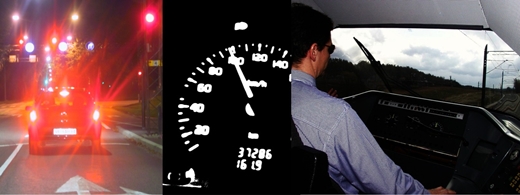The project consists of five different work packages.
Work package 1:
Fatigue, reduced vigilance and monotony as a problem in Norwegian transport operations
Here we will try to learn about the prevalence, causes, outcomes and management of fatigue in different transport sectors, organisations and job roles in Norway. We want to identify:
- challenges that are shared and unique for different types of sector, organisation and job role
- unique sectoral conditions that cause fatigue
- unique national conditions that cause fatigue
- what future research needs to do to allow fatigue to be tackled more effectively
Our knowledge will be generated using three methods:
- extensive literature review (winter 2013)
- two-hour interviews with representative experts, at least three each from the road, rail, sea and air sectors (autumn-winter 2012)
- small-scale survey of operators of six different transport forms, selected based on parts (i) and (ii) to represent a range of fatigue-related challenges (n = 50 for each transport form) (2014).
Work package 2:
In-depth knowledge on the prevalence, causes and safety outcomes of fatigue in Norwegian shipping
This package is in two parts, a large scale survey of the sea sector in Norway, and a doctorate project on accident risk.
-
Large-scale survey. Little has been done to chart the problem of fatigue at sea in Norway. We therefore want to carry out a detailed survey about the occurrence and causes of fatigue and sleepiness on different sea vessel types and in different maritime organizations in Norway. In particular we want to know how common fatigue and sleepiness in different role types, crew structures and maritime organizations. This knowledge is needed as the basis of education and information, to consider the design of improved watch systems, and in order to target and select FMP measures appropriately. The package will run from Autumn 2013 to Winter 2014. For more information on this WP please contact Ross Owen Phillips, rph@toi.no.
- It is largely assumed that fatigue plays a major role in grounding accidents in Norwegian waters. We shall attempt to quantify the accident risk that is due to fatigue, by studying the role of fatigue in incidents and accidents that have occurred at sea in Norway. How does fatigue, in combination with related systemic factors such as nature of the work task or monotony, build up to cause serious incidents at sea? How big are the risks from fatigue relative to risks from other factors? The package will run to Summer 2015. For more information on this WP please contact Juned Akhtar, jak@toi.no .
Work package 3:
Evaluation of a demonstration FMP for the road fleet of a major Norwegian firm
In this WP we want to test the hypothesis that FMPs reduce fatigue-related accidents and injuries. Ideally, measurements would be taken before and after FMP implementation in a large organisation, where staff numbers give sufficient statistical power to detect changes in fatigue-related accident and injury numbers. We hope that it will also be possible to identify and evaluate the corresponding change in a control group (i.e. not exposed to the FMP). The hope is that the FMP to be implemented could act as a demonstration model for FMPs in Norway. This WP is planned to run from end 2012 to Spring 2015. For more information on this WP please contact Fridulv Sagberg, fs@toi.no .
Work package 4:
A tool to guide managers on how to select measures for and implement an FMP according to the particular contingencies of their organization
Organisations in each transport sector in Norway and elsewhere vary widely in size, culture (safety and organisational), hierarchy, job roles and technology. Despite this, there is little or nothing in existing guidelines informing managers how to select measures and implement an FMP according to these contingencies. A clear recommendation from Phillips & Sagberg (2010) is that a tool is needed to help managers tailor FMP measure selection and implementation according to the particular contingencies of their organisation. There is probably sufficient information in the existing safety and organisational literature to allow such a tool to be developed, but such a tool would need to be piloted and evolved in collaboration with transport managers representing different types of contingency.
A guidance document shall be prepared based on a literature review, which will in turn be based on the detailed recommendations laid out by Phillips & Sagberg (2010). The document will be designed for the future piloting and further development in collaboration with managers from selected transport organizations, but the piloting and development is not part of this project. It is hoped that the tool will be ready by end 2014. For more information please contact Ross Owen Phillips (rph@toi.no).
Work package 5:
Summary of findings and implication for regulation of fatigue in transport
The subject of a single report shall be a focused review of the findings in the context of fatigue regulation in different transport sectors and different transport forms in Norway. The report will be ready by Summer 2015. For more information please contact Ross Owen Phillips (rph@toi.no).






